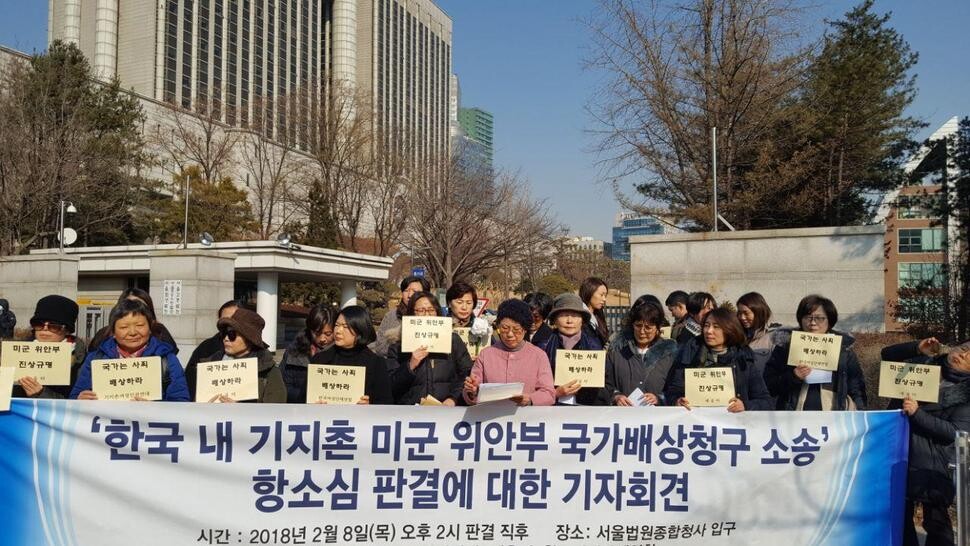hankyoreh
Links to other country sites 다른 나라 사이트 링크
Court finds that South Korean government encouraged prostitution near US military bases

A court issued a first-ever ruling acknowledging that the Republic of Korea actively justified or encouraged prostitution with the operation of US “military camp towns” for the sake of the military alliance and foreign currency acquisition.
“In regarding the right to sexual self-determination of the women in the camp town and the very character of the plaintiffs as represented through their sexuality as means of achieving state goals, the state violated its obligation to respect human rights,” the court concluded, ordering the payment of compensation to all 117 plaintiffs.
Hon. Judge Lee Beom-gyun of Seoul High Court’s 22nd civil affairs division ruled on Feb. 8 in the case filed by 117 former military camp town prostitutes to demand damages from the state, which was ordered to pay compensation of 7 million won (US$6,370) to 74 of the plaintiffs and 3 million won (US$2,730) to the remaining 43.
“According to official Ministry of Health and Welfare documents, [the state] actively encouraged the women in the military camp towns engage in prostitution to allow foreign troops to ‘relax’ and ‘enjoy sexual services’ with them,” the court said.
“In the process, [the state] operated and managed the military camp towns with the intention or purpose of contributing to maintenance of a military alliance essential for national security by ‘promoting and boosting morale’ among foreign troops while mobilizing prostitutes for economic goals such as acquisition of foreign currency,” it ruled.
The state was subsequently concluded to have violated the women’s human rights by operating camp towns nationwide and actively encouraging and justifying prostitution practices through “patriotic education” and illegal treatment for sexually transmitted diseases (STDs).
“The state actively encouraged and justified acts of prostitution within the military camp towns through patriotic education praising prostitutes as ‘patriots who bring in foreign currency,’” the court said.
The court further ruled the state to have “used STD treatment as an excuse for ‘suppression’ [crackdowns] and ‘contag’ [interning prostitutes identified by infected troops], during which basic rights were directly violated by segregation of the camp town prostitutes in forced internment facilities or through the indiscriminate administration of penicillin, which carries serious physical side effects.”
“Illegal acts of STD treatment stemmed from disregard for the women’s dignity as human beings that was motivated by concerns about setbacks in their use for purposes of national security and foreign currency acquisition, which existed as the other side of the same coin as acts of active justification and encouragement of prostitution,” the court said.
The court’s ruling was the first ever to recognize state responsibility for prostitution at the US military camp towns. Women at the towns – commercial zones set up around US Forces Korea bases from the 1950s onward – faced the twofold agony of prostitution and forced segregation in the name of “STD management.” Their first request for damages from the state did not come until June 2014. But in the first trial ruling in Jan. 2017, Hon. Judge Jeon Ji-won of Seoul Central District Court’s 22nd civil affairs division ordered compensation of just 5 million won (US$4,550) to 57 of 120 plaintiffs on the grounds that forced segregation of camp town prostitutes prior to the adoption of enforcement regulations for the Prevention of Contagious Diseases Act on Aug. 19, 1977, had been unlawful.
The High Court recognized a broader scope of state responsibility, acknowledging psychological and physical damages from the women’s forced segregation that extended beyond the period when it took place. Based on this conclusion, it ruled that the women “appear to have suffered extreme physical suffering in addition to psychological damages from illegal internment and inappropriate [STD] treatment.”
By Kim Min-kyung, staff reporter
Please direct questions or comments to [english@hani.co.kr]

Editorial・opinion
![[Guest essay] The real reason Korea’s new right wants to dub Rhee a founding father [Guest essay] The real reason Korea’s new right wants to dub Rhee a founding father](https://flexible.img.hani.co.kr/flexible/normal/500/300/imgdb/original/2024/0423/8317138574257878.jpg) [Guest essay] The real reason Korea’s new right wants to dub Rhee a founding father
[Guest essay] The real reason Korea’s new right wants to dub Rhee a founding father![[Column] ‘Choson’: Is it time we start referring to N. Korea in its own terms? [Column] ‘Choson’: Is it time we start referring to N. Korea in its own terms?](https://flexible.img.hani.co.kr/flexible/normal/500/300/imgdb/original/2024/0423/3617138579390322.jpg) [Column] ‘Choson’: Is it time we start referring to N. Korea in its own terms?
[Column] ‘Choson’: Is it time we start referring to N. Korea in its own terms?- [Editorial] Japan’s rewriting of history with Korea has gone too far
- [Column] The president’s questionable capacity for dialogue
- [Column] Are chaebol firms just pizza pies for families to divvy up as they please?
- [Column] Has Korea, too, crossed the Rubicon on China?
- [Correspondent’s column] In Japan’s alliance with US, echoes of its past alliances with UK
- [Editorial] Does Yoon think the Korean public is wrong?
- [Editorial] As it bolsters its alliance with US, Japan must be accountable for past
- [Guest essay] Amending the Constitution is Yoon’s key to leaving office in public’s good graces
Most viewed articles
- 1[Column] ‘Choson’: Is it time we start referring to N. Korea in its own terms?
- 2Senior doctors cut hours, prepare to resign as government refuses to scrap medical reform plan
- 3[Guest essay] The real reason Korea’s new right wants to dub Rhee a founding father
- 4Why Korea shouldn’t welcome Japan’s newly beefed up defense cooperation with US
- 5Opposition calls Yoon’s chief of staff appointment a ‘slap in the face’
- 6New AI-based translation tools make their way into everyday life in Korea
- 7Terry Anderson, AP reporter who informed world of massacre in Gwangju, dies at 76
- 8[Column] The clock is ticking for Korea’s first lady
- 9Samsung barricades office as unionized workers strike for better conditions
- 10Korean government’s compromise plan for medical reform swiftly rejected by doctors